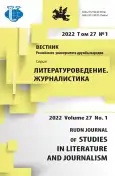Historical and Cultural Processes and Periodization of Arabic Literature
- Authors: Zarytovskaya V.N.1
-
Affiliations:
- Peoples’ Friendship University of Russia
- Issue: Vol 27, No 1 (2022)
- Pages: 68-85
- Section: LITERARY CRITICISM
- URL: https://journal-vniispk.ru/2312-9220/article/view/318974
- DOI: https://doi.org/10.22363/2312-9220-2022-27-1-68-85
- ID: 318974
Cite item
Abstract
The article is devoted to the theoretical problem of the periodization of the Arab national literature. The issue of dividing Arabic literature into periods has long been in the focus of both Arab and Western, as well as Russian literary researchers. Undoubtedly, such issues, which have recently acquired relevance in connection with the growing interest in modern Arabic literature, require analysis from such points of view as the multiplicity and variability of existing periodizations, the reasons for the discrepancy between the periodizations of European and Arab national literatures and various approaches to the compilation of periodization by Arab and European specialists. The purpose of this work was designated as an attempt to demonstrate, using analysis and comparison, as well as the method of historicity, the redundancy or, conversely, the insufficiency of some periodizations and the terms used in them, to find different names for the same periods with the same artistic principles and time frames, as well as to establish the factors that had the strongest influence on the development of Arabic literature. In the course of the study, conclusions are drawn about the inexpediency of correlating the periodization of Arabic literature with general European, as well as about the key role of a number of factors in the history of Arabic literature. First, linguistic (minimal changes in the literary language since the codification of the Qur’an in the 7th century), that ensured the continuity and tradition of Arabic literature, which for centuries preserved and cultivated figurative systems and stylistic devices of preIslamic times. Secondly, the factor of national domination - a purely Arab or general Muslim character of the society. Under the conditions of the latter, there was a mutual enrichment of the literatures of the peoples included in the caliphate, which entailed fundamental changes in the genre system and themes of Arabic literature. The author thus holds the idea that the originality of Arab literature is due to the characters of Arab preIslamic culture in general and verbal culture in particular and the historical processes of the Middle Ages in the Middle East, first of all - the rapid formation of the Caliphate as an imperial state and the including of most Arab countries a part in the Ottoman Empire, where Arabic was not the state language, from the XIV century and before the territorial redistribution of the results of the World War I.
About the authors
Victoria N. Zarytovskaya
Peoples’ Friendship University of Russia
Author for correspondence.
Email: widaad@yandex.ru
ORCID iD: 0000-0001-9910-7913
Associate Professor of Department of Foreign Languages, Faculty of Humanities and Social Sciences
10 Miklukho-Maklaya St, Moscow, 117198, Russian FederationReferences
- Abu Nuwas. (In Russ.) Retrieved November 22, 2021, from http://litena.ru/books/item/f00/s00/ z000 0059/st030.shtml
- Al-Hajjaj, Abu al-Husein Muslim. (1991). The Right Path of a Muslim. Beirut: Dar alkutu bal-ilmiyya Publ. (In Arabic).
- Alharbi, M. (2021). Linguistic Appropriateness in the Quranic Text. College of Arts and Humanities Journal, 417–461.
- Al-Manfaluti, M. (1981). To Tolstoy. Arabic Romantic Prose of the 19th–20th Centuries (pp. 80–87). Leningrad: Hudozhestvennaya literature Publ. (In Russ.)
- Arabic Literature. (In Russ.) Retrieved October 24, 2021, from http://granat.wiki/enc/a/ arabskaya-literatura
- Bettayeb, N. (2021). Speech Synthesis System for the Holy Quran Recitation. International Arab Journal of information Technology, 18 (1), 8–15.
- Bolshakov, O.G. (1998). Caliphate History. Between two Civil Wars 656–696. Moscow: Vostochnaya literature publ. (In Russ.)
- Derwish, A. (2008). An Introduction to Modern Arabic Literature. Cairo: Maarif publ. (In Arabic).
- Diwan of Imru’ al-Qays. Poem 2, quoted in Dictionary of Literary Biography (p. 213).
- Retrieved November 02, 2021, from https://quotepark.com/quotes/2062107-imru-al-qais-weepfor-me-my-eyes-spill-your-tears-and-mourn/
- Filshtinskij, I.M. (1985). History of Arabic Literature. V — Early IX Century. Moscow: Nauka publ. (In Russ.)
- Ibn Al-Arabi. (In Russ.) Retrieved November 02, 2021, from http://litena.ru/books/item/f00/s00/ z0000059/st060.shtml
- Imruulqais. (2013). Muallaqa. Literary Translation from Arabic by A.A. Dolinina. Written Monuments of the East, (1), 32–38. (In Russ.)
- Korotaev, A.V., Klimenko, V.V., & Prussakov, D.B. (2007). Emergence of Islam. Moscow: Center for Civilizational and Regional Studies of the Russian Academy of Sciences publ. (In Russ.)
- Krachkovskiy, I.Y. (1956). Arabic Poetry. Selected Works. (V. II). Moscow–Leningrad: USSR Academy of Sciences publ. (In Russ.)
- Muallaqat. Retrieved November 05, 2021, from http://alcala.ru/literaturnaia-enciklopedia/slovar-M/4676.shtml (In Russ.)
- Said Edward W. (2006) Orientalism. Western Concepts of the East. Saint Petersburg: Russkij mir publ. (In Russ.)
- Shidfar, B.Y. (2016). The Figurative System of Arabic Classical Literature (VI–XII Centuries). Moscow: Mardjani publ. (In Russ.)
- Shair, Ali K., Abdul Mujeeb, B., & Zainab, A. (2021). Quran and Metonymy: Literal, Semantic and Metonymic Translation (Analysis of English Translation of Quranic Verse). Fahm-i-Islam. Biannual Research Journal, January-June, 1–15.
- Stoyanova, N.I. (2012). Literary History of the Countries of the Second Foreign Language. Makhachkala: DGU publ. (In Russ.)
- Suvorov, M.N. (2010). Postmodernism in Arabic Literature. Postmodernism in the Literatures of Asia and Africa (pp. 72–122). Saint Petersburg: SPGU Publ. (In Russ.)
- Trubeckoy, N.S. (1987). On the Sound Changes of the Russian Language and the Collapse of the General Russian Linguistic Unity. Selected Works on Philology (pp. 143–167). Moscow: Progress Publ. (In Russ.)
Supplementary files









